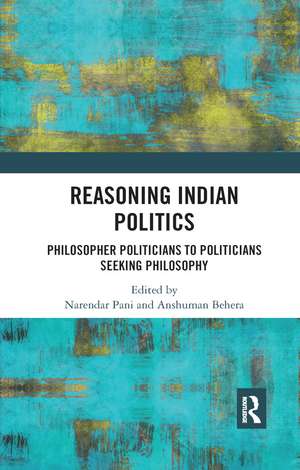Reasoning Indian Politics: Philosopher Politicians to Politicians Seeking Philosophy
Editat de Narendar Pani, Anshuman Beheraen Limba Engleză Paperback – 12 dec 2019
This book traces the transition from philosopher politicians to politicians seeking philosophy in Indian polity in the post-independence era and its implications for current practices. It views Indian political philosophy from the standpoints of political theorists, philosophers, and practitioners. With expert and scholarly contributions, this volume will be of interest to students and researchers of Indian political thought and political philosophy, social sciences, and humanities.
| Toate formatele și edițiile | Preț | Express |
|---|---|---|
| Paperback (1) | 259.98 lei 6-8 săpt. | |
| Taylor & Francis – 12 dec 2019 | 259.98 lei 6-8 săpt. | |
| Hardback (1) | 1054.71 lei 6-8 săpt. | |
| Taylor & Francis – 17 noi 2017 | 1054.71 lei 6-8 săpt. |
Preț: 259.98 lei
Preț vechi: 311.41 lei
-17% Nou
Puncte Express: 390
Preț estimativ în valută:
49.75€ • 53.20$ • 41.48£
49.75€ • 53.20$ • 41.48£
Carte tipărită la comandă
Livrare economică 17 aprilie-01 mai
Preluare comenzi: 021 569.72.76
Specificații
ISBN-13: 9780367884109
ISBN-10: 0367884100
Pagini: 268
Dimensiuni: 138 x 216 mm
Greutate: 0.45 kg
Ediția:1
Editura: Taylor & Francis
Colecția Routledge India
Locul publicării:Oxford, United Kingdom
ISBN-10: 0367884100
Pagini: 268
Dimensiuni: 138 x 216 mm
Greutate: 0.45 kg
Ediția:1
Editura: Taylor & Francis
Colecția Routledge India
Locul publicării:Oxford, United Kingdom
Public țintă
PostgraduateCuprins
List of contributors. Preface. 1. On the ‘Why’ of Indian politics Narendar Pani and Anshuman Behera Part I: On Indian Political Theory 2. The Poverty of Indian Political Theory Bhikhu Parekh 3. Further Thoughts on Contemporary Indian Political Theory Bhikhu Parekh Part II: Three Philosopher Politicians 4. On the Idea of 'Mahatma': Revisiting the Poverty of Indian Political Theory A. Raghuramaraju 5. What Is Living and What Is Dead in Rammanohar Lohia? Yogendra Yadav 6. Ambedkar on Indian Democracy Arun K. Patnaik Part III: The Search for Philosophy 7. Literarization and Trans-Islamism: Life and After-life of Sayyed Sanaulla Makthi P. K. Yasser Arafth 8. From Mao to Maoism: The Indian Path Anshuman Behera Part IV: Towards an Ontology of Indian Politics 9. Ideation and the politics of legality and morality in India Narendar Pani 10. Being Dalit after Gandhi and Ambedkar: Insights from Devanoora Mahadeva Compiled, edited, and translated by Bageshree Subbanna Index
Notă biografică
Narendar Pani is Professor at the National Institute of Advanced Studies, Bengaluru, India. He has been writing on politics in both academia and the media since the 1980s. His research interests lie in his interpretation of the Gandhian method to understand current Indian and global realities. This method, as explored in his book, Inclusive Economics: Gandhian Method and Contemporary Policy (2001), seeks an alternative to ideology-centric approaches to the social sciences.
Anshuman Behera is Assistant Professor in the Conflict Resolution Programme at the National Institute of Advanced Studies, Bengaluru, India. A co-author of the book Militant Groups in South Asia (2014), his research interests deal with the socio-political conflicts in India and Nepal. In addition to extensive work on Maoism, he has also written on political processes in South Asia.
Anshuman Behera is Assistant Professor in the Conflict Resolution Programme at the National Institute of Advanced Studies, Bengaluru, India. A co-author of the book Militant Groups in South Asia (2014), his research interests deal with the socio-political conflicts in India and Nepal. In addition to extensive work on Maoism, he has also written on political processes in South Asia.
Recenzii
‘Just how do philosophy and politics interact in India? In exploring the voyage of modern Indian politics through its early "philosopher politicians" — Gandhi, Lohia, Ambedkar and partly Nehru — to its current political leaders, who instead of philosophical grounding seek philosophical justifications for their mostly transactional politics, this book provides refreshingly new perspectives. An intellectually rewarding read!’
Ashutosh Varshney, Director, Centre for Contemporary South Asia, Watson Institute of International and Public Affairs, Brown University, USA
Ashutosh Varshney, Director, Centre for Contemporary South Asia, Watson Institute of International and Public Affairs, Brown University, USA
Descriere
This volume examines the forms of reasoning in Indian politics, tracing the transition from philosopher-politicians to politicians seeking philosophy in Indian polity during the post-independence era. It then analyses the implications of such reasoning on current practices from the standpoints of political theorists
